Transferts monétaires et mobilité humaine
Les transferts monétaires sont souvent utilisés lors de crises afin de répondre aux besoins des personnes migrantes. Dans cette page, vous trouverez des ressources sur les transferts monétaires et la migration.

La Croix-Rouge se prépare à fournir une aide humanitaire aux migrant·es de la caravane sur le point de quitter le Honduras pour le Guatemala.
©Johannes Chinchilla / FICR.
Conflits, crises économiques et catastrophes sont autant de raisons ayant contraint des personnes à fuir et à traverser des frontières dans des conditions éprouvantes et risquées, en quête de sécurité et de moyens de subsistance. En 2020, le nombre de personnes déplacées de force s’est envolé au niveau sans précédent de plus de 80 millions de personnes, soit près du double du nombre enregistré il y a une dizaine d’année. Cette tendance s’aggrave et les effets du changement climatique menacent de déplacer jusqu’à 200 millions de personnes d’ici 2050.
L’assistance monétaire est de plus en plus utilisée afin de répondre aux besoins des personnes en situation de déplacement. On y a eu recours à grande échelle dans différents contextes de migration, en Europe en 2015 jusqu’au Venezuela pour « los caminantes ». Elle a également été utilisée dans d’autres crises migratoires, notamment en Amérique centrale, au Sahel, en Méditerranée et dans la Corne de l’Afrique. L’assistance monétaire est à l’heure actuelle l’une des principales formes d’aide apportée aux populations déplacées en Ukraine et dans les pays voisins.
Il existe une myriade de perspectives et de définitions concernant le mot « migrant·e » et la façon dont les humanitaires doivent agir. C’est pourquoi nous ne choisissons pas une définition unique pour le moment, étant donné que les discussions sur l’assistance monétaire et la migration en sont encore à leurs prémices et que le langage évolue encore.
Documenter et partager les données probantes donnera lieu à des interventions plus efficaces. Cette page contient une sélection de ressources utiles concernant la migration et le recours à l’assistance monétaire. Elle sera mise à jour au fil des discussions ayant lieu dans les espaces humanitaires des transferts monétaires.
Priorités actuelles
Afin de contribuer aux progrès relatifs à cet enjeu, nous nous engageons à :
- soutenir la création de données probantes aux niveaux régional et mondial ;
- contribuer aux solutions pratiques visant à mettre en œuvre les transferts monétaires auprès des personnes migrantes ;
- organiser des discussions sur les enjeux majeurs basées sur des données probantes.
Contenu récent
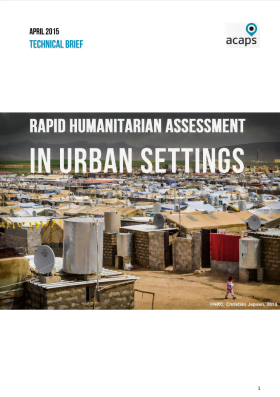
Rapid Humanitarian Assessment in Urban Settings
Guidelines and Tools
This Technical Brief is intended to be a starting point for improving coordinated needs assessments in urban areas, without which the humanitarian community will not be able to ensure the quality and accountability of urban response itself. It provides guidance on carrying out joint rapid assessments of...
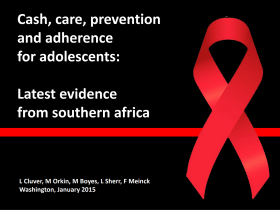
Cash, Care, Prevention and Adherence for Adolescents: Latest evidence from southern Africa
Presentation
This presentation looks at cash, care, prevention and adherence for adolescents using the National Longitudinal study of Adolescents in Southern Africa.
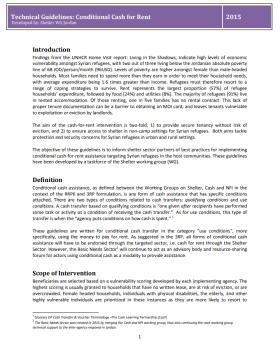
Technical Guidelines: Conditional Cash for Rent
Guidelines and Tools
The guideline was prepared by UNHCR Shelter Working Group in Jordan with the objective of informing shelter sector partners of best practices for implementing conditional cash-for-rent assistance targeting Syrian refugees in the host communities. The guide explores how to define the scope of a cash...
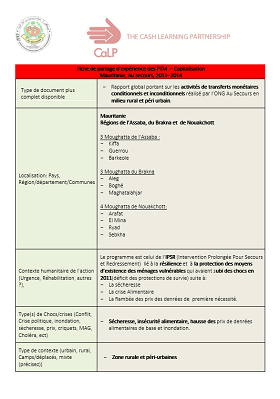
Fiche de partage d’expérience des PTM – Capitalisation Mauritanie, 2011 – 2014
Rapport
Rapport global portant sur les activités de transferts monétaires conditionnels et inconditionnels réalisé par l’ONG Au Secours en milieu rural et péri urbain.
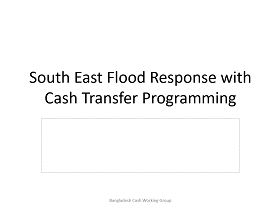
South East Flood Response with Cash Transfer Programming
Report
The biggest criteria is what needs is your cash transfer expected to cover. Consider below questions when setting your CTP amount. -How much will it cost for intended beneficiaries to purchase goods in local markets? -Are there any other goods and services on which HH may spend available cash? -Are prices...

Guide de mise en œuvre d’e-transfert
Guides et outils
Le Guide de mise en œuvre d’e-transfert a été créé pour les membres de l’équipe de Mercy Corps qui envisagent d’utiliser – ou qui utilisent déjà – les e-transferts pour apporter l’aide aux participants au programme. Les chapitres 1 et 2 donnent un aperçu des étapes nécessaires à...

Can Emergency Cash Transfers ‘Piggyback’ on Existing Social Protection Programmes?
Policy paper
This background note focuses on the current discussion among actors in the humanitarian and social protection sectors regarding the use of existing social protection programmes to provide an emergency response. It outlines the overlaps between social protection and humanitarian responses, considers a...
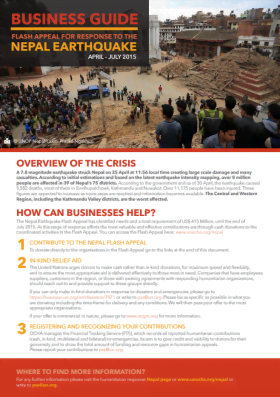
Business Guide – Flash appeal for response to the Nepal earthquake
Policy paper
An overview of the main humanitarian issues facing Nepal following the 2015 Earthquake, as well as indicators as to how businesses can assist with disaster response.
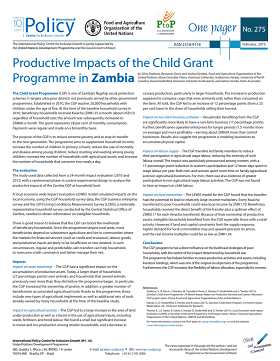
Productive Impacts of the Child Grant Programme in Zambia
Report
This short one page paper looks at the impacts of the Child Grant Programme in Zambia on asset ownership, agricultural activity, non-farm business activities, labour supply and local economies. The CGP is one of Zambia’s flagship social protection schemes. It targets ultra-poor districts not previously...

Capacity Building Theory Of Change
Guidelines and Tools
Capacity Building is a foundation of the CALP Network’s vision, focus and mandate, and our Capacity Building Strategy emanates from a Theory of Change that describes how the CALP Network’s inputs and activities result in short-term outcomes and can lead to long-term outcomes and ultimate impact. The...
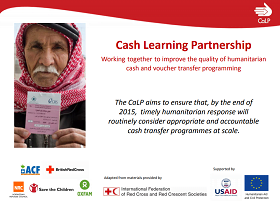
Cash Learning Partnership
Guidelines and Tools
The CALP Network aims to ensure that, by the end of 2015, timely humanitarian response will routinely consider appropriate and accountable
cash transfer programmes at scale.
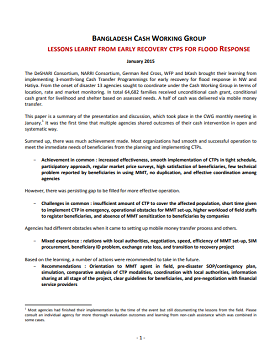
Bangladesh Cash Working Group: Lessons Learnt From Early Recovery CTPS For Flood Response
Report
The DeSHARI Consortium, NARRI Consortium, German Red Cross, WFP and bKash brought their learning from implementing 3-month-long Cash Transfer Programmings for early recovery for flood response in NW and
Hatiya. From the onset of disaster 13 agencies sought to coordinate under the Cash Working Group in...

Electronic Cash Grants in Emergencies: Approaches and lessons learned
Report
Cash distributions in an emergency: A concept that seems so obvious today yet has only recently gained recognition within humanitarian response programming for its speed, efficiency and—above all—effectiveness.
This document provides a snapshot for humanitarian response peers on best practices,...
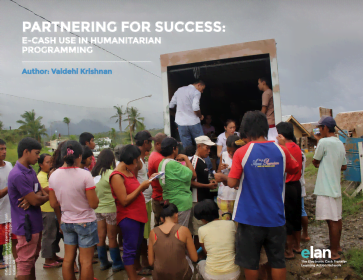
Partnering for Success: E-cash use in humanitarian programming
Policy paper
In recent years, new technologies have facilitated electronic cash transfers (e-transfers) to disaster- and conflict-affected populations. Utilizing e-cash in emergency response requires close partnerships with Financial Service Providers (FSPs), often in places where electronic payments are still...
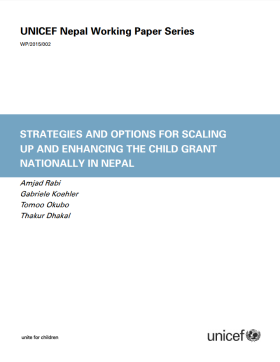
Strategies and Options for Scaling Up and Enhancing the Child Grant Nationally in Nepal
Policy paper
The objective of this study is to offer to the Government of Nepal (GoN) a set of reflections and options regarding the continuation, scale-up and enhancement of the Child Grant (CG), a cash transfer program for children under the age of 5 introduced by the GoN in 2009. While the original intention was to...

Assistance monétaire multisectorielle pour les réfugiés syriens et les communautés d’accueil au Liban : Programme d’IRC
Rapport
Il est de plus en plus reconnu au sein du secteur humanitaire que, en situation d’urgence, les transferts monétaires et les coupons (appelés communément transferts monétaires ou PTM, programmes intégrant des transferts monétaires) peuvent être des outils appropriés et efficaces pour venir...

Maximising the Nutritional Impact of Humanitarian Food Assistance
Report
Over the past years, DG ECHO has placed a strong focus on nutrition, renewing its commitment to improve nutrition-specific programing through the release of the Nutrition Staff Working Document (2013) and the IYCF-E guidance document in 2015. However, the improvement of the nutrition status of...

Impacts of the Child Grant Programme (CGP) on the Local Economy in Zambia
Report
In this research brief, local economy-wide impact evaluation (LEWIE) simulation methods are used to assess the likely impacts of cash transfers on the local economy. When the Child Grant Programme (CGP) gives money to beneficiary households, they spend it to buy goods and services. As this cash circulates...
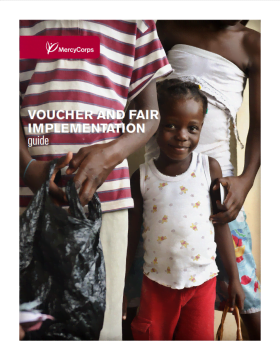
Voucher and Fair Implementation Guide
Guidelines and Tools
Mercy Corps’ Voucher and Fair implementation Guide provides clear, step-by-step guidelines for teams implementing cash, restricted cash, or commodity voucher programmes. Written for an internal audience, the Guide may also be useful for peer agencies.
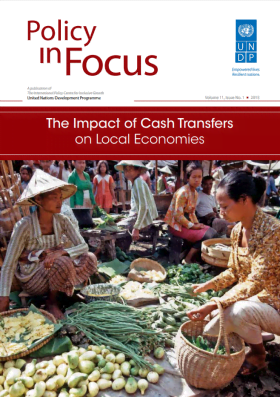
The Impact of Cash Transfers on Local Economies
Policy paper
In this special edition of Policy in Focus, leading authors and practitioners present their research on how cash transfers can impact the local economy when implemented in a developing country. The aim is to gather and review research results and evidence, obtained from various methodologies ranging from...